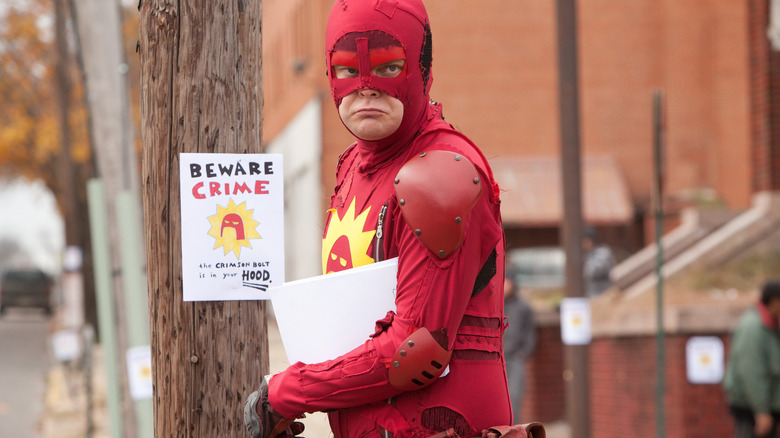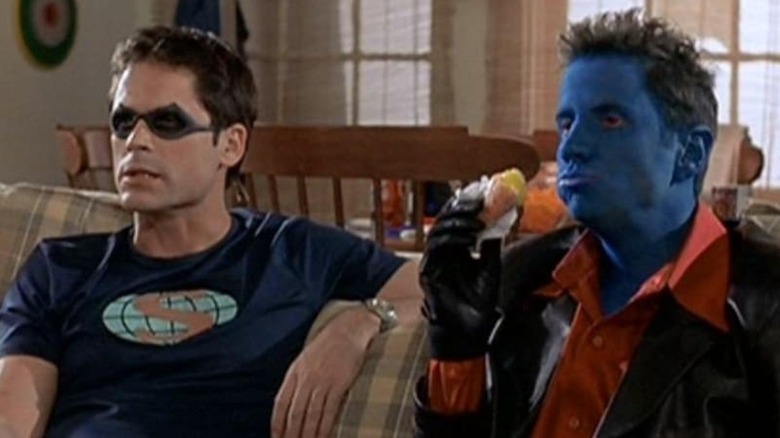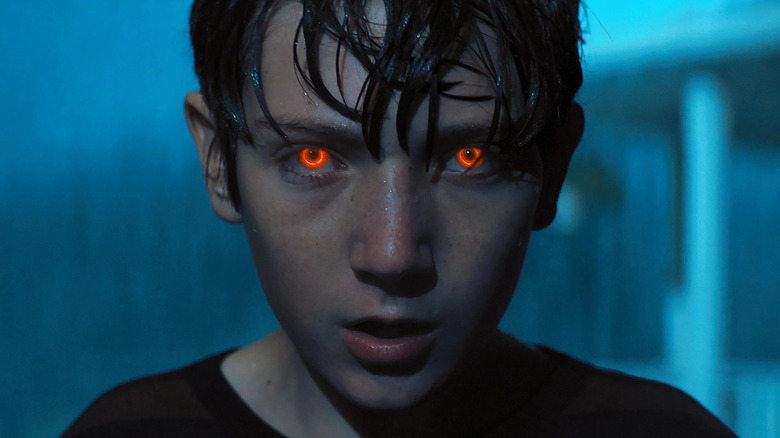James Gunn's Superman Couldn't Be More Different Than His First, Forgotten Superhero Movies
James Gunn seemingly used to hate superheroes. One can see this in several of his early movies. The fact that he is now the master of a whole, completely earnest superhero universe — led by his own aw-shucks "Superman" movie — feels strange. The man has clearly made a 180-degree turn away from his impish, youthful impulses toward deconstruction and has embraced a po-faced superhero seriousness that the young Gunn may not recognize.
Case in point: In 2000, when writer/director James Gunn was still on the rise, he penned Craig Mazin's low-budget superhero comedy "The Specials," starring Thomas Haden Church, Rob Lowe, Jamie Kennedy, Padget Brewster, and Judy Greer. Gunn and his brother Sean also appeared in the film. It followed the titular superhero team on their day off, when there was no crime to fight and no supervillains to foil. The Specials all had superpowers, but looked largely unremarkable in civilian life, a blue-skinned energy being notwithstanding. They all discussed banal, personal topics, kvetching about their personal relationships and financial hardships. One of them, the Weevil, even considers leaving the Specials for a better-funded superhero team.
Gunn was breaking down superhero conventions with "The Specials," depicting ultra-beings not as noble fighters for righteousness or even self-serious vigilantes wracked by guilt, but plain-spoken, none-too-intelligent everypeople infected with recognizable everyday lust, greed, and boredom. They would fight crime if the situation called for it, but they were, back at base, just as petty as you or me.
And "The Specials" isn't the only case of Gunn ripping heroes to shreds. At least three of his movies are about how being a superhero is terrible in practice. Something shifted along the way, however, and Gunn changed his tune. It may have been the success of "Guardians of the Galaxy" that turned him from a satirist into a company man.
James Gunn used to be the sharpest superhero satirist working in Hollywood
One might also recall Gunn's 2011 film "Super," his second feature as a director. In that film, Rainn Wilson played Frank, a sad, disconnected fry cook whose wife had recently left him for a charismatic drug dealer and strip club owner. Frank is depressed, and only takes comfort in a low-budget Christian superhero show called "Holy Avenger." Out of the blue (quite literally), Frank encounters God, who removes his skullcap and directly touches his brain. Frank becomes convinced that he should be a superhero, and stitches together his own costume, calling himself the Crimson Bolt. He arms himself with a heavy metal monkey wrench and takes to the streets.
"Super" points out, though, that thwacking people in the head with a wrench is a bloody, terrible thing to do, even in a vigilante context. "Super" also points out that superheroes are not motivated by righteousness, but by a combination of rage, sadness, and maybe a little sexual fetish; his sidekick Boltie, played by Elliot Page, gets aroused by superhero costumes and wants to use vigilante violence to get back at ex-boyfriends. "Super" is a bleak, sad tragedy about how superheroes are a sad escape from our sad lives. And the filmmaker would go on to make "Superman?" It's a very strange shift in ethos for Gunn.
Four years after "Super," Gunn wrote and directed "Guardians of the Galaxy," a PG-13 sci-fi thriller for Marvel Studios that was one part satire to nine parts corporate-approved CGI action. There is some cynical humor to "Guardians," of course, and there is certainly some absurdity to making a movie that features a talking tree and a bitter, violent raccoon, but Gunn had clearly sanded down his own edges. "Guardians" was about a dysfunctional group of misfits becoming a slightly functional found family. The bitterness of films like "The Specials" and "Super" started to fall by the wayside.
How did the guy who produced Brightburn also make Superman?
Gunn's new ethos of making "slightly irreverent" superhero movies brought him massive commercial success. He made two additional "Guardians of the Galaxy" feature films, as well as a "Guardians" Christmas special. Mixed in the middle of those films was "The Suicide Squad," another film about supervillains who team up to do good. "Squad," however, was more interested in exploring the character's relatable, emotional earnestness, pointing out that damaged people are capable of redemption. Although the film was violent and R-rated, it still had a disarming, non-satirical quality, aiming for the audience's hearts and not their middle fingers.
The fact that Gunn has made a wholly straightforward "Superman" feature film is all the more baffling in light of David Yarovesky's "Brightburn," a 2019 horror movie that Gunn produced and that was written by his brother Brian and his cousin Mark. "Brightburn" was about a young boy named Brandon (Jackson A. Dunn) who discovers he has Superman-like powers, including flight, invulnerability, and eye lasers. Also like Superman, Brandon is raised on a small farm in Kansas, but his life is wracked by poverty, and his childhood ruined by bullying. When the 12-year-old Brandon finds he has powers, he sees no reason not to become a vengeful monster, killing those who wronged him.
Although Gunn didn't write or direct "Brightburn," he clearly signed off on the idea that Superman, in the real world, would quickly become a villain. Power corrupts, Gunn seems to be saying, and Superman would be the most corrupt of them all.
Now, a mere six years later, Gunn is back to playing it straight with "Superman." He lost his anger, his cynicism. Emotional earnestness and commercial safety seemed to have served his career better, and he's likely matured as a human, of course. Still, it's wild to think that Gunn so dramatically shed his punk rock coat and traded it in for a suit and tie.
"Superman" is in theaters now.


